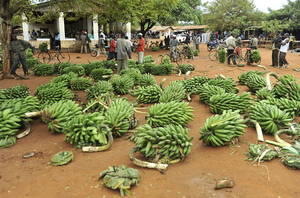 inued importance of multinational companies in the global trade of bananas, their involvement in banana production has fallen dramatically over the past three decades, shifting their sphere of action to favor other areas in the sector and opening the door to opportunities for other companies.
inued importance of multinational companies in the global trade of bananas, their involvement in banana production has fallen dramatically over the past three decades, shifting their sphere of action to favor other areas in the sector and opening the door to opportunities for other companies.This view of the changing nature of the global banana trade is captured in a new FAO information note and based on analysis of information gathered from the annual reports of the largest multinational banana trading companies.
FAO's review of the three largest banana traders (Chiquita, Dole and Del Monte), shows that the combined market share of the top three companies was at its highest the 1980's, when they controlled almost two-thirds (65.3 percent) of global banana exports, while in 2013, their market share was slightly over one-third (36.6 percent).
In 2013, the market share of the top five companies was 44.4 percent, down from 70 percent in 2002.
"The competition among banana producing countries is fierce and many have struggled to remain competitive, but there are also new opportunities, as the market is no longer dominated by big players - and new buyers are entering the market," says Ekaterina Krivonos, an Economist at the Trade and Markets Division of FAO.
Economists in the Secretariat of FAO's Intergovernmental Group on Bananas and Tropical Fruits conducted the analysis amid a flurry of reports on the merger last month of Chiquita, the largest banana trading company in the world and the dominant company in the US market (61 percent of the company's sales), and Fyffes, one of the main suppliers to the European market.
Trading places
The information note shows that the scope of operations of the big multinationals has also undergone a significant shift, away from plantation ownership and production, and more towards post-production logistics, including purchasing from producers, transportation, facilities to ripen the fruit, and marketing.
Major supermarket chains in the United States and the European Union, meanwhile, have become "important players in the global banana trade as they dominate the retail market in the main banana-consuming countries and are also increasingly purchasing from smaller wholesalers or directly from growers," the note underscores.
This shift of market power away from the major banana brands towards retailers was facilitated by the establishment of direct container liner services from banana producing regions to the main destination markets. Moreover, there is a parallel trend towards less concentration among the exporting firms in the major banana producing countries, for example in Ecuador.
In the information note, FAO points out that while the merger that formed ChiquitaFyffes made the new company an undisputed leader in the banana market, with 18.7 percent control of global banana exports, "it is unlikely that the merger will give the new company sufficient market power to exert pressure over the banana market and influence either producer prices or import/wholesale prices, given the importance of other market actors, in particular in Europe and Russia."
Support for smaller producers
As banana markets become more fragmented and new players continue to enter the fray, there is an important message for banana producers.
"In order to seize opportunities in an increasingly competitive market, banana producers need to be better informed and better prepared, including smallholder producers and any cooperatives or other organizations that represent them," said Kaison Chang, Secretary of the FAO Intergovernmental Group on Bananas and Tropical Fruits.
"FAO is working with governments and producers to help them build their viability by maintaining good cultivation practices, preventing and fighting plant diseases, strengthening producer organizations and developing both domestic and international marketing strategies," Chang said.
"In this changing market structure, it is vital that smallholders, as well as producer organizations, receive support in all of these areas, in order to be fully included in their national economies and to build the resilience of farming families in the banana industry."





